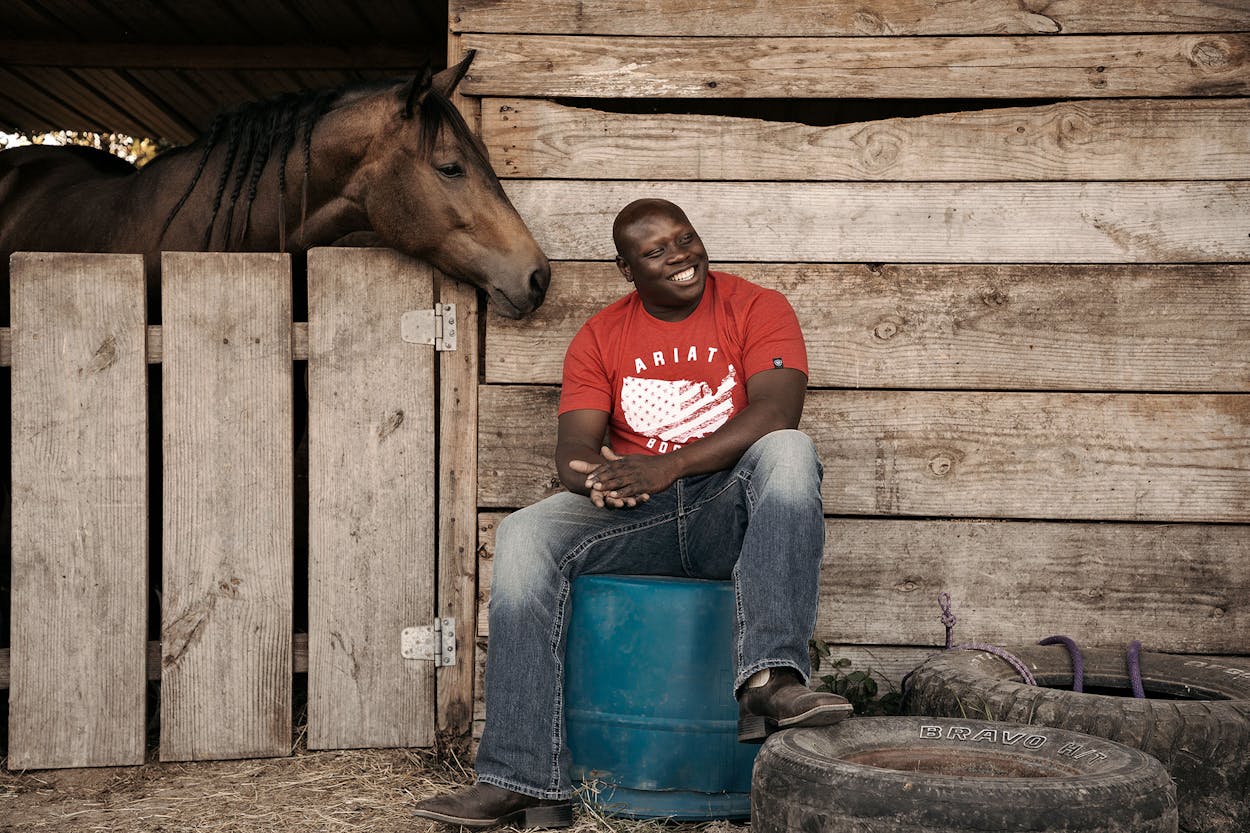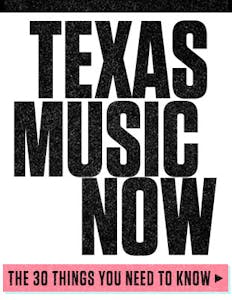This article is part of our November 2017 issue, which features a comprehensive look at Texas music.
The wooded backstreets leading to Bruno’s Triangle 7 Arena one rainy Saturday night last spring were resonant with croaking toads in the ditches and fragrant with smoking barbecue, so isolated from urban life that I almost forgot I was only eleven miles northeast of Houston’s skyscrapers. On any given weekend, all around Houston and deep into South Louisiana, fans have sought the beloved, decades-old traditions of a zydeco trail ride. But after I followed the thump of deep bass into a wood-paneled lodge, where revelers were congregating around indoor picnic tables, the modern era became evident. On a threadbare stage, all alone save for a DJ, stood Baldenna Tha King, the 33-year-old inventor and current standard-bearer of Houston music’s latest subgenre: trail-riding rap.
I arrive just in time for one of his hits, “Saddle Up.”
Saddle up, and move ’em out,
I’m headed to the trail ride and it’s about to go down.
Camp out tonight, and we leave about three,
If you’re lookin’ for me, homey, you know where I’ll be.
“Country rap,” as the genre is referred to on the trail ride, was a natural product of musical evolution, but while Houston rap is now world-famous, trail rides that celebrate African American cowboy culture have remained something of a local secret. Texas trail rides begin with a Friday evening campout featuring a DJ or a band, then continue into Saturday with the ride itself: a long caravan of horseback riders and decorated party wagons, each with a DJ aboard, blasting a mix of zydeco, blues, hip-hop, and a sprinkling of honky-tonk. (Some of the party wagons are pulled by big ol’ pickup trucks, but in the traditional rides, more of the wagons are wood-wheeled and pulled by mule teams.) After the ride, another show on Saturday night features zydeco, Southern soul, or, in Baldenna’s case, country rap: songs, like “Need Me a Cowgirl,” “Trailride in My City,” and “Party Wagon Rock,” that could come only from Houston.
After Baldenna rapped a laid-back set of zydeco-informed South Side hip-hop, he amped the crowd with another one of his hits, often played on Majic 102.1’s Live After 5 show, “Trail Ride Crush.”
She got a horse of her own. She don’t need help,
and plus she mind her own, keep her business to herself.
The dance floor quickly filled with women in their thirties clad in matching Texas cowboy–themed T-shirts line-dancing, zydeco-style, clapping their hands in unison. Clearly these were women who could identify with Baldenna’s muse, and when the song was over, they commenced beer-bonging Bud Lites, cheering one another on while Anthony Ramon “Baldenna” Fountain—sturdily built, with a round face and a strong jaw—wiped sweat from his clean-shaven head and walked toward the parking lot for a break.
“I need my CD and my shirt,” a young woman said, walking past.
“Yes, ma’am,” Baldenna said, indicating he would hook her up later.
Zydeco continues to thrive because it absorbs newer styles—Clifton Chenier brought in blues and rock and roll; Buckwheat Zydeco and Beau Jocque added soul and funk—all while retaining its own syncopated accordion and rubboard essence. (Counter to the modern narrative of Texas urbanization, the horse-culture themes underpinning the genre keep getting stronger.)
Hip-hop was zydeco’s next challenge: it would have to absorb rap or become increasingly irrelevant. In the mid-nineties, Houston-based artists like J. Paul Jr. began tinkering with this fusion; later, some artists rapped about standard topics over zydeco music. But Baldenna is the first to rap almost exclusively about zydeco subject matter—even, sometimes, with no backing zydeco track. Like Ritchie Valens, the pioneer of Chicano rock, Baldenna is doing something unique: arranging the structures of hip-hop and zydeco to create something new.
Fans appreciate Baldenna’s identification with the culture. “Most of the rappers that you hear who deal with zydeco, they will come [in on] a collab, you know,” says veteran trail rider and Baldenna fan Tasha Earvin. Rappers on these collaborations are hired guns with little interest in the culture, Earvin explains. Baldenna wasn’t an opportunist; he wanted to contribute to the trail ride. “I couldn’t play accordion, but I did want to play zydeco,” he told me. “When I would listen to another style of music, I would always put in my head how to make zydeco out of that music.”
Baldenna thought about this conundrum when he’d rap about girls and money—as his fellow Worthing High School alums turned Houston rap legends Lil’ Flip and Lil’ Keke had done. Then one day he heard Memphis rapper Yo Gotti’s Deep South hit “5 Star (Chick)” and had an idea.
Playing on the title, he wrote “Cowgirl Chick,” a tune rapped in a Dirty South style about Gulf Coast trail-ride life. The night Baldenna self-released the single, in 2012, Houston’s top zydeco DJ, DJ Ricky D, the “Magic Man,” played it no fewer than five times at Houston’s rowdy South Side zydeco hub, the Silver Eagle Club. “The whole club went crazy every time, so I was like, ‘All right, this is what I’m gonna do.’ ”
And so he has. Every generation since Clifton Chenier has seen its lamenting traditionalists. In the eighties, Chenier purists accused Buckwheat Zydeco of heresy; Buckwheat’s fans accused Beau Jocque of the same in the nineties. Baldenna has a lot of respect for the music’s Louisiana roots. But he is proud that Houston leads modern zydeco. “Not saying [traditionalists will] be content with their genre not being in the same lane, but in Houston, we’re always trying to do something different in everything we do,” he said. “We always lookin’ to take it up a notch.”
Listen to Baldenna’s “Trailride in My City”









